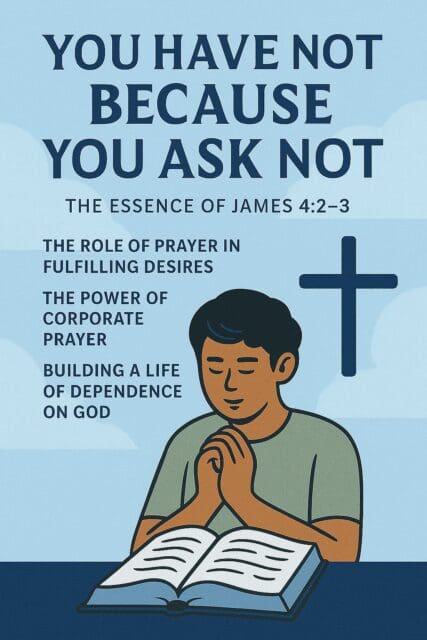Life moves fast. We chase goals, work hard, and often end up exhausted and unsatisfied. James 4:2–3 cuts through the noise:
“You have not because you ask not.”
This verse calls out the root of our frustration—forgetting to bring our needs and desires before God. It’s a reminder that prayer isn’t a last resort; it’s the first place we should turn.
Related reading: How to Pray When You Don’t Want to Pray
The Heart of James 4:2–3
James explains that conflict and disappointment come when we seek fulfillment apart from God. Instead of turning to Him, we rely on ourselves or compare our lives to others.
The passage challenges believers to ask God first, trusting that His wisdom and provision are better than our own plans.
The Right Way to Ask
Prayer isn’t just about asking—it’s about how we ask. James 4:2–3 teaches three essential attitudes for effective prayer:
1. Pray with Sincerity
God values honest, heartfelt communication. He already knows our needs but wants us to come to Him openly.
2. Pray with Right Motives
Requests centered on selfish desires can cloud our prayers. When we pray according to God’s will, we align our hearts with His.
3. Pray with Faith
Trusting God means believing He hears us—even when the answer doesn’t come right away. Faith sustains us while we wait.
Also see: 5 Steps to a Better Prayer Life
Expanding Our Prayers Beyond Ourselves
“You have not because you ask not” isn’t just a personal message—it’s a call to intercede for others. Our prayers can bring healing, unity, and hope to families, churches, and communities.
When we pray for others, our focus shifts from what we want to what God wants to do through us.
The Power of Corporate Prayer
James’s teaching also points to the strength of collective prayer. When believers gather with one heart and purpose, God moves in remarkable ways.
Corporate prayer fosters unity, deepens faith, and reminds us that we’re part of something greater than ourselves.
Read next: The Irresistable Power of Small Group Prayer
Building a Life of Dependence on God
Ultimately, this verse is about learning dependence. Our abilities are limited, but God’s resources are endless.
Prayer builds humility and peace, shifting our confidence from self-reliance to God’s perfect provision.
When prayer becomes part of daily life, it changes everything—it shapes our desires, aligns our priorities, and fills us with peace that the world can’t offer.
Key Takeaway
The message of James 4:2–3 is simple yet powerful:
Ask God. Trust Him. Depend on Him.
Prayer isn’t a formula for getting what we want—it’s a relationship that brings us closer to the One who provides everything we need.


